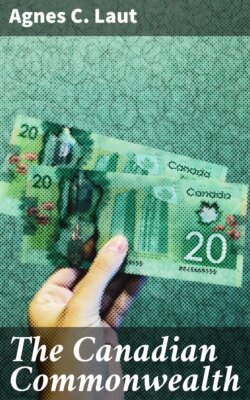Читать книгу The Canadian Commonwealth - Agnes C. Laut - Страница 17
На сайте Литреса книга снята с продажи.
THE TIE THAT BINDS I
ОглавлениеIt is easy to understand what binds the provinces into a confederation. They had to bind themselves into a unity with the British North America Act or see their national existence threatened by any band of settlers who might rush in and by a perfectly legitimate process of naturalization and voting set up self-government. At the time of confederation such eminent Imperial statesmen as Gladstone and Labouchère seriously considered whether it would not be better to cut Canada adrift, if she wanted to be cut adrift. The difference between the Canadian provinces and the isolated Latin republics of South America illustrates best what the bond of confederation did for the Dominion. The why and how of confederation is easy to understand, but what tie binds Canada to the Mother Country? That is a point almost impossible for an outsider to understand.
England contributes not a farthing to Canada. Canada contributes not a dime to England. Though a tariff against alien lands and trade concessions to her colonies would bring such prosperity to those colonies as Midas could not dream, England confers no trade favor to her colonial children. There have been times, indeed, when she discriminated against them by embargoes on cattle or boundary concessions to cement peace with foreign powers. Except for a slight trade concession of twenty to twenty-five per cent. on imports from England—which, of course, helps the Canadian buyer as much as it helps the British seller—Canada grants no favors to the Mother Country. In spite of those trade concessions to England, in 1913 for every dollar's worth Canada bought from England, she bought four dollars' worth from the United States.
Certainly, England sends Canada a Governor-General every four years; but the Cabinet of England never appoints a Governor-General to Canada till it has been unofficially ascertained from the Cabinet of the Dominion whether he will be persona grata. Canada gives the Governor-General fifty thousand dollars a year and some perquisites—an emolument that can barely sustain the style of living expected and exacted from the appointee, who must maintain a small viceregal court. The Governor-General has the right of veto on all bills passed by the Canadian government; and where an act might conflict with Imperial interests, he would doubtless exercise the right; but the veto power in the hands of the Imperial vicegerent is so rarely used as to be almost dead. Veto is avoided by the Governor-General working in close conference with the prevailing Cabinet, or party in power; and a party on the verge of enacting laws inimical to Imperial interests can be disciplined by dismissal from office, in which case the party must appeal to the country for re-election. That means time; and time allows passion to simmer down; and an entire electorate is not likely to perpetrate a policy inimical to Imperial interests. In practice, that represents the whole, sole and entire power of England's representative in Canada—a power less than the nod of a saloon keeper or ward boss in the civic politics of the United States. Officially, yes; the signature of the Governor-General is put to commissions and appointments of first rank in the army and the Cabinet and the courts. In reality, it is a question if any Governor in Canada since confederation has as much as suggested the name of an applicant for office.
On the other hand, Canada's dependence on England is even more tenuous. Does a question come up as to the "twilight zone" of provincial and federal rights, it is settled by an appeal to the Privy Council. Suits from lower courts reversed by the Supreme Court of Canada can be appealed to England for decision; and in religious disputes as to schools—as in the famous Manitoba School Case—this right of appeal to Imperial decision has really been the door out of dilemma for both parties in Canada. It is a shifting of the burden of a decision that must certainly alienate one section of votes—from the shoulders of the Canadian parties to an impartial Imperial tribunal.
If there be any other evidence of bonds in the tangible holding Canada to England and England to Canada—I do not know it.
